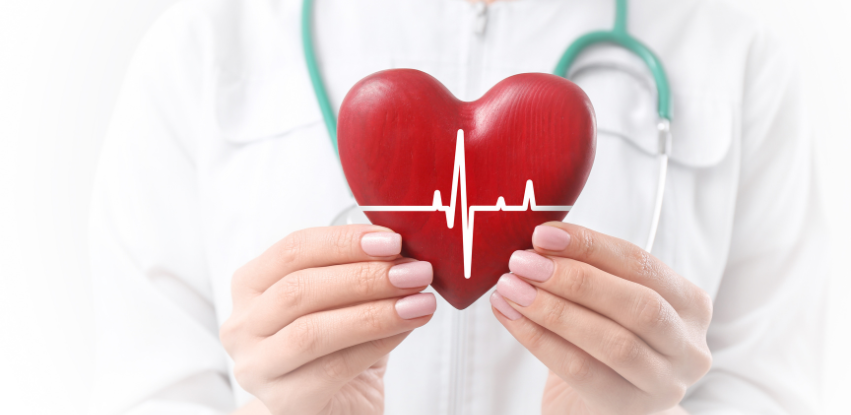Heart health and menopause
Menopause and heart disease
The increased risk of developing heart disease (cardiovascular disease - CVD) in menopause is a very real health concern. Pre-menopause, a woman’s risk of having a heart attack is lower than a man’s but that risk rises significantly, post-menopause. The International Menopause Society say ‘cardiovascular disease is the number one killer of women in the western world’(2009), yet it’s still the case that too few women know this. The perception is often that heart disease and heart attacks are male conditions. With this lack of awareness women are less likely to make the lifestyle changes that could help, seek medical advice, or indeed recognise when they are having a heart attack.
How does menopause increase the risk of cardiovascular disease?
From puberty to perimenopause, the hormone oestrogen, plays a role in protecting the heart against disease, controls cholesterol levels and actively reduces the build-up of fatty plaques in the artery walls. As this protection fades, the risk of arteries narrowing and plaque deposits building up increases, blood pressure rises, blood vessels become stiffer - all factors linked to heart attacks and stroke.
Depleting oestrogen levels in perimenopause affects blood pressure, changes heart rhythms, and can raise your heart rate (between 8 to 16 beats per minute). Your heart feels like it’s pounding, fluttering or missing a beat and this may last a few seconds or several minutes. Perimenopausal palpitations can happen alongside other menopause favourites hot flushes, night sweats and anxiety!
Menopause heart disease and medical treatment
Perimenopause can also bring heart palpitations and heartbeat irregularities. They may well be harmless but they should be assessed by a health professional to be sure.To rule out any more serious cause of heart disease post-menopause see your doctor if you’re regularly experiencing palpitations or shortness of breath, chest discomfort or dizziness.
What are the signs of heart attack in women?
There are various symptoms of heart attack in women that you need to look out for which tend to be subtler and more confusing than mens:
Uncomfortable pressure, squeezing, fullness or pain in the centre of your chest lasting more than a few minutes, it may go away and then return.
Pain or discomfort in one or both arms, your back, neck, jaw or stomach.
Shortness of breath with or without chest discomfort.
Cold sweat, nausea or lightheadedness.
Chest pain is the most common symptom.
Just remember nausea, vomiting, shortness of breath are more female specific symptoms, so do call for help or seek medical assistance if experiencing any of these symptoms.
Keeping your heart healthy in menopause
What are the steps you can take to reduce your risk of developing heart disease going into perimenopause?
Monitor blood pressure
Manage weight
Quit smoking
Limit alcohol to light to moderate levels
Be cholesterol aware
Move more, ensure you do a minimum of 150 minutes of moderate-intensity activity or 75 minutes of vigorous activity per week
Eat a healthy, balanced diet of colourful vegetables, fruits, whole grains, oily fish and proteins
Cut back on unhealthy fats and sugars, particularly in processed foods
Does HRT have any risks for coronary heart disease?
The BHF say ‘Taking HRT in tablet form can increase the risk of a blood clot, which such as deep vein thrombosis (DVT) in the lower leg or pulmonary embolus in the lung. But this risk can be reduced by having HRT through the skin, as a patch or gel. You should discuss your individual needs with your GP.’
Recent evidence shows that menopausal women taking HRT have no higher risk of dying from a heart attack than women who don’t take HRT.
Hormonal imbalance may be the cause of palpitations. For those able to take HRT, be aware that you may initially experience an increase in the number of heart palpitations before hormones balance.
Early menopause and heart health
If you have had an early menopause (before the age of 40), it’s very important that you consider your heart health and treatments to protect it, the risk of considered at a higher risk of premature coronary heart disease. The most common treatments are HRT and the combined contraceptive pill. We suggest you talk to your doctor to check if these are suitable for you.
HRT and high blood pressure
If you have high blood pressure or you are taking medicines to lower your blood pressure, you should be able to take HRT in certain forms. Your doctor should keep an eye on your blood pressure and they will adjust your medication accordingly if required.
Blood Pressure UK say ‘Oestrogen prescribed as a patch, gel or spray allows your blood vessels to widen, so it does not raise your blood pressure and can actually work to lower it. Progestogens have differing effects, but the newer type, micronised progesterone, seems to have no effect on blood pressure or even lowers it’.
The PositivePause caveat, there are pros and cons to taking HRT. We don’t take a view. It’s for you to decide whether it’s for you or not.
Read the related article: Does Menopause Raise Cholesterol Levels?
And the good news is…
Heart palpitations should stop post-menopause. Stress-related palpitations should also ease once your doctor has ruled out anything more serious.
Raised blood pressure and cholesterol increase the risk of heart disease. These risks can be greatly reduced with simple diet and lifestyle changes.




















